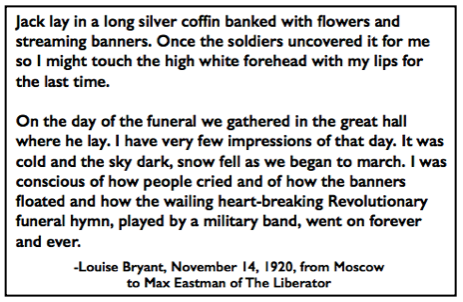 ———————-
———————-
Hellraisers Journal – Monday November 7, 1921
“Aftermath” by Louise Bryant in Memory of John Reed
From The Liberator of November 1921:
 ———————-
———————-
Hellraisers Journal – Monday November 7, 1921
“Aftermath” by Louise Bryant in Memory of John Reed
From The Liberator of November 1921:
 —————
—————
Hellraisers Journal – Monday September 19, 1921
Photo Shows Big Bill Haywood at Unveiling of John Reed Memorial in Moscow
From the Oregon Sunday Journal of September 18, 1921:
From The Liberator of September 1921:
 ———-
———-
Hellraisers Journal – Friday April 22, 1921
Chicago, Illinois – Federal Officials Confirm Haywood is in Russia
From The Leavenworth Post of April 21, 1921:
(By The Associated Press.)
Chicago, April 21.-Federal officials today received confidential information that William D. Haywood, secretary of the Industrial Workers of the World who was scheduled to begin a sentence at United States penitentiary, at Leavenworth this week, had fled from the United States and now is in either Moscow or Riga.
Attorney Admits Departure.
Otto Christensen, attorney for Haywood, said he had been informed that Haywood sailed from New York on the Oscar Second about April 1, and landed at Riga about April 16. He said he thought Haywood had gone to Russia on a personal mission and was not fleeing from the penitentiary sentence.
Authorities Start Search.
Charles F. Clyne, United States district attorney announced that search had been started for Haywood.
“He is not at Leavenworth, Chicago, nor New York, and we have private information that he has landed either at Moscow or Riga,” said Clyne.
“That is all we know about it but we expect to have definite information very quickly.”
 ———-
———-
Hellraisers Journal – Thursday February 3, 1921
Louise Bryant Writes from Moscow on Death of John Reed
From The Liberator of February 1921:
Last Days With John Reed
A Letter from Louise Bryant
Moscow, Nov. 14, 1920
Dear Max:
I knew you would want details and a story for the Liberator–but I did not have either the strength or the courage. As it is–I will be able to write only a very incoherent letter and you may take from it what you wish. Jack’s death and my strenuous underground trip to Russia and the weeks of terror in the typhus hospital have quite broken me. At the funeral I suffered a very severe heart attack which by the merest scratch I survived. Specialists have agreed that I have strained my heart because of the long days and nights I watched beside Jack’s bed and that it is enlarged and may not get ever well again. They do not agree, however, on the time it will take for another attack. I write to you all these stupid things because I have to face them myself and because it must be part of the letter. The American and German doctors give me a year or even two, the Russians only months. I have to take stimulants and I am not in a bit of pain. I think I have better recuperative powers than they believe–but, anyway, it is a small matter. I once promised Jack that I would put all his works in order in case of his death. I will come home if I get stronger and do so.
All that I write now seems part of a dream. I am in no pain at all and I find it impossible to believe that Jack is dead or that he will not come in this very room any moment.
Jack was ill twenty days. Only two nights, when he was calmer, did I even lie down. Spotted typhus is beyond description, the patient wastes to nothing under your eyes.
But I must go back to tell you how I found Jack after my illegal journey across the world. I had to skirt Finland, sail twelve days in the Arctic ocean, hide in a fisherman’s shack four days to avoid the police with a Finnish officer and a German, both under sentence of death in their own countries. When I did reach Soviet territory I was at the opposite end of Russia from Jack. When I reached Moscow he was in Baku at the Oriental Congress. Civil war raged in the Ukraine. A military wire reached him and he came back in an armored train. On the morning of September 15th he ran shouting into my room. A month later he was dead.
 ———-
———-
Hellraisers Journal – Wednesday December 8, 1920
Max Eastman: “John Reed sacrificed a life to the revolution…”
From The Liberator of December 1920
-“Fog” by John Reed:
———-
JOHN REED
[-from Speech by Max Eastman.]
WE have been reading in the great newspapers of this city the last few days very appreciative accounts of the life and character of John Reed. They have permitted themselves to admire his courage and honesty and the great spirit of humorous adventure that was in him. They permit themselves to admire him in spite of the fact that he died an outlaw and a man wanted by the police as a criminal. They admire him because he is dead. But we speak to a dIfferent purpose. We pay our tribute to John Reed because he was an outlaw. We do not have to examine the indictment, or find out what special poison the hounds of the Attorney-General had on their teeth against John Reed. We know what his crime was-it is the oldest in all the codes of history, the crime of fighting loyalty to the slaves. And we pay our tribute to him now that he lies dead, only exactly as we used to pay it when he stood here making us laugh and feel brave, because he was so full of brave laughter. Our tribute to John Reed is a pledge that the cause he died for shall live.
 ———-
———-
Hellraisers Journal – Monday November 1, 1920
Moscow, Russia – John Reed Died at His Post on October 17th
From The Liberator of November 1920:
 ———-
———-
Hellraisers Journal – Sunday October 31, 1920
Moscow, Russia – Great Funeral Demonstration Panned for John Reed
From the Cleveland Toiler of October 30, 1920:
John Reed Is Dead
By Robert Minor.
The Tzar Nicholas once complained that he was unable to have the best of Russian music because, unfortunately, the best composers were guilty of the crime of sedition and he could not encourage them.
Today the Tzar Nicholas lies in a hole in the ground of a Siberian village, and the sweetest music of Russia is played in his palace to the ears of the plain workingmen for whom the composers really wrote their music anyway.
In Moscow there died the other day a great American literary artist, John Reed. He was a young man, only thirty-three, and already known about the earth as one of the finest of American artists.
John Reed began his career ten years ago as a reporter for the New York World and for the New York Tribune. He did well. Very soon he graduated from the ranks of daily reporters and was acknowledged as one of the most brilliant writers on the high-priced magazines that spend their thousands to get the best of writing.
 ———-
———-
Hellraisers Journal – Tuesday October 19, 1920
Moscow, Russia – John Reed Has Died of Typhus, According to Cable
From The Butte Daily Bulletin of October 18, 1920:
JOHN REED DlES IN MOSCOW SAYS CABLE
—————
Well Known American Radical Writer and Editor
Succumbs to Typhus, According to Message.
——-(Special United Press Wire.)
Portland, Ore., Oct. 18.-John Reed, well known radical writer and editor, died Sunday at Moscow, Russia, according to cablegrams received by his relatives here. Typhus was the cause.
Reed spent considerable time in Russia as a war correspondent and writer for magazines. He had been previously on the staff of the American magazine. He returned to the United States after the war with a commission as Soviet ambassador to the United States, but his commission was later recalled.
——-
Reed’s commission as ambassador to the United States was refused recognition by the state department.
An address by Reed recently delivered in Moscow was widely quoted in the press of the United States and Europe within the last two weeks. In his address Reed was quoted as declaring that the workers in the United States and Europe were in favor of recognition of the Soviet republic, but that the opposition to such recognition was being fostered by reactionary interests connected with the international financial interests.
—————
[Emphasis added; Newsclip added from Utah’s Ogden Standard of February 19, 1918.]